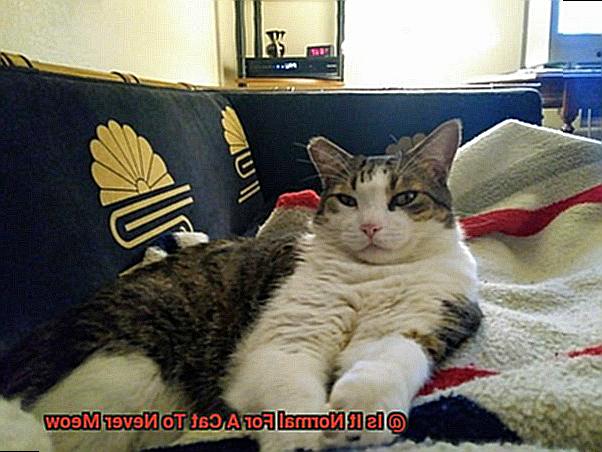We all know that our feline friends are full of surprises, with their own unique quirks and personalities. Some cats are chatty and meow up a storm, while others prefer to keep things quiet.
But have you ever wondered if it’s normal for a cat to never meow? Let’s dive into the world of feline communication and discover the truth about this intriguing behavior.
So, sit back with your furry companion and let’s unravel the mystery together.
Is It Normal For A Cat To Never Meow?
Contents
Well, the answer is yes and no.
Firstly, it is important to understand that meowing is not the only form of communication for cats. They also use body language, scents, and other vocalizations such as purring and hissing to express themselves. So if your cat doesn’t meow, it doesn’t mean they are incapable of communicating.
Moreover, some cat breeds are known for being quieter than others. For example, Siamese cats are known for their loud and frequent meows, while breeds like Persians tend to be more reserved. So if your cat rarely meows but is otherwise healthy and exhibits normal behavior, it could simply be a breed characteristic.
But what if your cat has suddenly stopped meowing after being very vocal before? This could be a sign of an underlying medical issue. Cats can develop respiratory infections or injuries that can affect their vocal cords and cause them to stop meowing. In these cases, it is important to take your cat to the vet for a proper diagnosis and treatment.
On the other hand, some cats may have learned not to meow as a way to get what they want. If a cat has never been rewarded with attention or food when they meow, they may learn that it is not an effective way to communicate with their human companions. This is especially common in cats that have been adopted from shelters or have had previous negative experiences with humans.
So what should you do if your cat never meows? Well, as long as your cat is exhibiting normal behavior and is healthy, there’s no need to worry. Your cat may have just found other ways to communicate with you. However, if you are concerned about your cat’s lack of meowing, it is always best to consult with a veterinarian.
Breeds and Their Vocalization Habits: Is It Normal for Some Cats to Never Meow?
In this section, I will explore the reasons behind a cat’s vocalization habits and provide tips for understanding and addressing any changes in your cat’s meowing behavior.
Do certain cat breeds meow less than others?
Yes, some cat breeds are known for being less vocal than others. These breeds include Abyssinian, American Curl, American Shorthair, Bengal, Birman, British Shorthair, Chartreux, Cornish Rex, Exotic Shorthair, Havana Brown, LaPerm, Munchkin, Persian, Ragdoll, and Scottish Fold. These cats still purr and may meow occasionally, but they are much less likely to make loud or frequent noises. They tend to communicate with other forms of body language, such as nudging, cuddling, or eye contact.
Which breeds are known for being the quietest?
The quietest cat breeds are generally those that have been bred to be companion animals rather than working cats. They tend to have a more relaxed and laid-back demeanor and don’t feel the need to vocalize as much as other breeds. In addition to the breeds mentioned above, some additional quiet cat breeds include the Burmese, Japanese Bobtail, Chartreux, Devon Rex, and Selkirk Rex.
Is it normal for a cat to never meow?
No, it is not normal for a cat to never meow at all. Meowing is a way that cats communicate with humans, and even quiet breeds will meow when they need something or want attention. If your cat has stopped meowing suddenly or can’t meow at all, it could be a sign of a physical or emotional problem.
Environmental Factors That Affect a Cat’s Meowing Behavior
After all, it’s their way of communicating with us, and being able to decipher their meows can help keep them happy and healthy.
HUNGER:
One of the most common reasons for a cat to meow excessively is hunger. Like humans, cats have a set schedule for meals, and if that schedule is not met, they will let you know by meowing loudly and persistently.
They may also meow to beg for extra food or treats, especially if they see you eating something they want. To address this behavior, it’s important to stick to a regular feeding schedule and avoid giving in to their demands for extra food.
ATTENTION-SEEKING:
Cats are social creatures, and they require love, attention, and stimulation from their owners. If they feel neglected or bored, they may meow to solicit attention or playtime.
They may also meow when greeting their owners or expressing affection. To reduce this behavior, make sure to spend quality time with your cat, provide them with toys and activities to keep them stimulated, and reward them when they are quiet instead of giving in to their demands for attention.
STRESS:
Cats are creatures of habit and dislike change. So when there is a significant change in their environment, such as a new person or pet in the home, a change in routine, or a move to a new house, they may become stressed and meow more often. This is their way of trying to get your attention and cope with the change.
To help your cat adjust, provide them with a safe and comfortable space where they can retreat and relax. It’s also essential to introduce any changes gradually and positively, using treats and praise to reinforce their confidence.
MATING:
Unspayed or unneutered cats may meow excessively when they are in heat, trying to attract a mate. This behavior can be quite annoying for owners and neighbors alike.
The best way to prevent this behavior is to spay or neuter your cat as early as possible, preferably before they reach sexual maturity.
Learned Behavior: Why Some Cats May Choose Not to Meow
While it may seem unusual, there are several reasons why your cat may choose to communicate without using their voice. As an expert in the topic of learned behavior, I will explore the various factors that may contribute to a cat’s quietness and provide practical tips for encouraging them to meow more often.
Naturally Silent or Learned Behavior?
Firstly, it’s essential to understand that some cats are naturally less vocal than others. Breeds such as Abyssinians, Russian Blues, and Scottish Folds are known for being quieter and prefer to communicate through other means such as body language and scent marking.
Additionally, a cat may have learned that meowing doesn’t yield a desired response from their human caregiver and have adapted to using other methods to get their needs met.
External Factors
It’s not uncommon for cats to become stressed, scared, or depressed due to changes in their environment or routine. Moving to a new home, losing a companion, or being introduced to a new pet can all cause anxiety in cats. In response, they may become quieter and show signs of avoidance.
If this is the case, providing support and allowing your cat time to adjust can help them feel more comfortable and confident.

Medical Conditions
In some cases, a cat’s lack of meowing may be due to an underlying medical condition affecting their vocal cords, throat, or respiratory system. If your cat is experiencing difficulty breathing or swallowing, coughing, sneezing, or weight loss, it’s essential to consult your veterinarian for proper diagnosis and treatment.
Encouraging Meowing Behavior
If you want your cat to meow more often, there are a few things you can try. Providing a stimulating and enriching environment with toys, puzzles, scratching posts, and perches can keep your cat entertained and engaged. Rewarding your cat with praise or treats when they meow can also encourage them to use their voice more often. Regularly talking to your cat and using a friendly tone of voice can also help them feel more comfortable and confident in communicating with you.
Medical Conditions That Can Affect a Cat’s Ability to Meow
From meowing for food to demanding attention, their distinct and sometimes incessant meowing is part of their charm. So, what does it mean when your cat suddenly stops meowing or has difficulty producing sounds?
It could be a sign of a medical condition.
List:
- Laryngeal paralysis
- Laryngeal or tracheal tumors
- Upper respiratory infections
- Hyperthyroidism
Table:
| Medical Condition | Symptoms |
| —————— | ——– |
| Laryngeal paralysis | Weak or paralyzed vocal cords, difficulty breathing or swallowing, raspy or hoarse meowing |
| Laryngeal or tracheal tumors | Difficulty breathing, coughing, gagging, wheezing, loss of voice or high-pitched meowing |
| Upper respiratory infections | Sneezing, nasal discharge, fever, loss of appetite, sore throat or hoarse meowing |
| Hyperthyroidism | Weight loss, increased appetite and thirst, vomiting, diarrhea, change in voice quality |
According to research, these medical conditions can affect a cat’s ability to meow and may require veterinary care. Laryngeal paralysis occurs when the muscles controlling the vocal cords become weak or paralyzed. This can be caused by trauma, infection, nerve damage, or tumors. Cats with this condition may have difficulty breathing and swallowing and may make raspy or hoarse sounds when trying to meow.
Tumors in the larynx or trachea can also obstruct the airway or press on the nerves that control the vocal cords. This can cause difficulty breathing and changes in meowing patterns. Upper respiratory infections can also affect a cat’s voice by causing inflammation of the vocal cords.
Hyperthyroidism, a condition where the thyroid gland produces too much hormone, can also impact a cat’s meowing. This can result in changes in pitch or volume of their meows.
Interjection: It is important to note that it is not normal for a cat to completely stop meowing due to these conditions. Meowing is a natural way for cats to communicate and any significant changes in their vocalization should be addressed by a veterinarian.
h2>When to Be Concerned: Signs of Potential Health Issues in Cats Who Don’t Meow
While it may seem cute or even amusing at first, it could be a sign of a potential health issue. As cat owners, it’s crucial to pay close attention to your furry friend’s meowing habits and be alert for any changes. In this section, we’ll discuss when you should be concerned about your cat’s meowing and potential signs of health issues.
Firstly, let’s talk about some possible signs of health issues in cats who don’t meow. These include hoarse meowing or a change in the sound of their meow, reduced appetite or difficulty eating, coughing, sneezing, discharge from their eyes or nose, increased drinking or urination, weight loss or lethargy, and swelling of the throat or difficulty breathing. If you notice any of these symptoms in your cat, it’s essential to consult your veterinarian as soon as possible.
So what could be causing your cat to suddenly stop meowing or change their meow? There are several possible reasons, including stress or anxiety, upper respiratory infections or viruses, laryngitis or laryngeal paralysis, hyperthyroidism, and tumors on the throat. These conditions can affect your cat’s ability to meow and require prompt veterinary attention for proper diagnosis and treatment.
As an expert on this topic, I highly recommend seeking veterinary care if you notice any changes in your cat’s meowing habits. Early diagnosis and treatment can improve their quality of life and prevent further complications. Remember, our feline friends cannot directly communicate with us about their health concerns; it’s up to us to be vigilant and observant.
Tips for Encouraging Your Cat to Meow More Often
Meowing is a form of communication that cats use to express their needs and desires. However, not all cats are equally vocal, and some may rarely meow at all. If you have a quiet cat and want to encourage them to meow more, read on for expert tips on how to achieve this.
High-Pitched Encouragement:
Cats respond well to positive reinforcement, and this applies to vocalization too. Whenever your cat meows, make sure to respond with a high-pitched and encouraging voice. This lets your cat know that you appreciate their communication and encourage them to continue meowing. Over time, your cat will associate meowing with positive attention from their owner.
Rewards and Toys:
Another way to encourage your cat to meow more is by offering rewards or toys whenever they meow. This positive reinforcement will let your cat know that meowing leads to something good, making them more likely to do it again. You can use treats or toys that make noise as rewards, which will also add an element of playfulness for your cat.
Play and Mental Stimulation:
Cats are naturally more active during dusk and dawn, but you can teach them to adapt to your schedule. During the day, try to play with and mentally stimulate your cat more often. This will not only keep them happy and engaged but may also make them more vocal. You can find special games for cats that simulate hunting and reward them with treats, satisfying their natural instincts.
Signs of Illness:
Sometimes, a lack of meowing may be a sign of a health issue in your cat. If you notice any changes in behavior or signs of illness like decreased appetite, increased thirst, weight loss, or changes in litter box habits, it’s essential to take your cat to the veterinarian for a check-up.
Meowing excessively may be a way for your cat to communicate that something is wrong.
By addressing any underlying health issues, you can help your cat feel better and potentially increase their vocalization.
Conclusion
In conclusion, the answer to whether it is normal for a cat to never meow is not a straightforward one. While some cats may naturally be less vocal than others, a complete absence of meowing could signal an underlying medical issue or learned behavior. As responsible pet owners, it is crucial to pay attention to our feline friends and understand their individual ways of communication.
If your cat suddenly stops meowing or has never been vocal, it is imperative to seek advice from a veterinarian to rule out any potential health concerns. Additionally, creating a stimulating and enriching environment for your cat can encourage them to express themselves through meows and other forms of body language.
Remember, our furry companions rely on us to comprehend their needs and desires. By being attentive and responsive to their communication, we can strengthen our bond with them and ensure their overall well-being.






